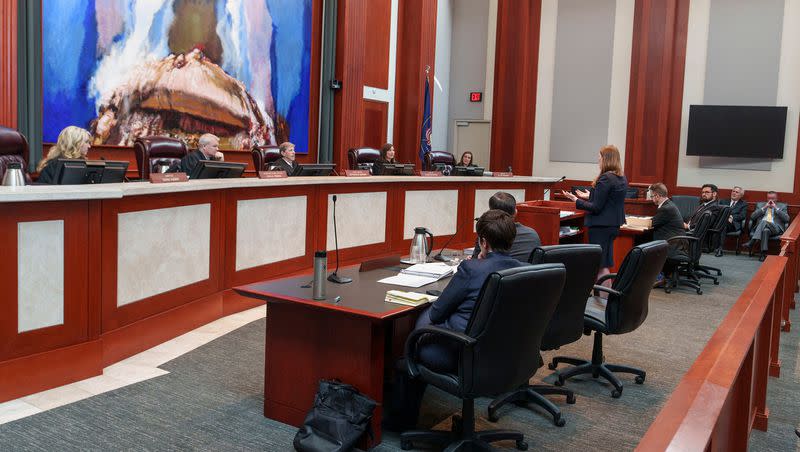Opinion: Gerrymandering is always political, the arguments against it are not

On July 11, Utah’s Supreme Court heard arguments in League of Women Voters v. Utah State Legislature. Mormon Women for Ethical Government is also a named plaintiff in this case, as well as a bipartisan group of seven individual voters. At the hearing, the Utah Legislature repeatedly argued that the motivations behind this case are purely political. This is a grave misrepresentation of our motivation and goals.
Mormon Women for Ethical Government is a strictly nonpartisan organization and the individual plaintiffs in this lawsuit include those who belong to both major political parties. All plaintiffs are committed to constitutional government and are determined to advocate for a democracy in which every voter can meaningfully participate. For our group, this commitment is further grounded in our determination to preserve individual agency and acknowledge the equal worth of every soul.
Because legislatures dominated by one party are driven to keep themselves in power, they assume that the only motivation to fight for fair, representative districts must be a similar desire among members of the minority party. But political gerrymandering in any state causes significant harm to all Americans, and to our democracy as a whole.
As plaintiffs in the lawsuit, our immediate purpose is to protect the expressed will of Utahns as enacted through Proposition 4, the 2018 ballot initiative that prohibited partisan gerrymandering and established an independent redistricting commission charged with creating fair maps. More broadly, we are working to promote systems to honor the democratic principles that should supersede party politics.
Related
Regardless of who is doing it, political gerrymandering harms democracy by disincentivizing political participation. Voters in distorted districts can feel that their vote counts unequally and matters less. Those in the majority anticipate that their party’s candidate will certainly win, while those in the minority know their votes cannot affect election outcomes. Both groups are therefore less likely to engage in learning about candidates, issues and platforms. Fewer citizens participate in the political process because of the accurate perception that election results are pre-determined by the district maps.
Partisan gerrymandering also harms democracy by increasing polarization. Gerrymandering enables politicians to draw districts where voters are certain to elect them, and they no longer need to do the hard work of persuading us of the merits of their positions. Over time, the fact that these districts overwhelmingly favor candidates from one party means policy positions move toward the extremes.
Because of this, unfair districts don’t only affect staunch partisans — moderates from both sides can also be ignored. Soon the policy enacted by representatives serves the interest of an ever-narrowing segment of the population, and tax dollars are spent on the priorities of the few. Those who aspire to be public servants should not insulate themselves from the will of the people, they should create a government that represents the broadest number of voters.
Finally, partisan gerrymandering harms democracy because it violates norms of ethical procedure and transparency. Ethical government requires ethical processes. It’s the means, as well as the ends, that demonstrate whether voters can trust and respect elected officials’ policy decisions even when the outcome is not what they prefer.
Utah’s recent redistricting process exemplifies how the pursuit of power can affect procedure and transparency. In 2018, when faced with the possibility of a continued partisan redistricting process, Utahns exercised their inherent political power to solve this problem directly. They voted in favor of Proposition 4 to put an end to the closed-door, hyperpartisan gerrymandering that skewed elections.
The process of creating maps through an independent commission requires deliberation by design. It reduces polarization and increases compromise. The Legislature, however, repealed the initiative so it could keep its ability to distort district lines. When it came time to redistrict the state, the legislature discarded the independent commission’s proposals and created its own maps in secret to benefit the political party in power.
The independent commission followed ethical government practices, inviting voter participation, conducting research and seeking compromises that would create truly representative district maps. The Legislature’s partisan maps, in contrast, harm democracy by disincentivizing voter participation, deepening political polarization and ignoring norms of ethical and transparent procedure.
Gerrymandering has long been a scourge of our democracy, inflicted on citizens by politicians from both parties seeking to retain partisan power. There are various ways voters can effectively address the problem of unfair districts, but when legislators have insulated themselves from consequential elections, voting them out is rarely one of them. This is why we have committed to this nonpartisan litigation. We seek to preserve fair elections, equal representation, and the balance of political power. We believe that Utah and all of its citizens, regardless of their party affiliation, will benefit from fair districts.
Jennifer Walker Thomas and Emma Petty Addams are the co-executive directors of Mormon Women for Ethical Government.

